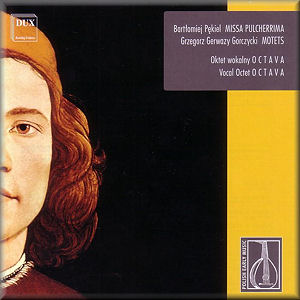 |
 |
|

AVAILABILITY
CD: AmazonUK
AmazonUS
|
Bartlomiej PEKIEL
(d.1670)
Missa Pulcherrima [27:12]
Sub tuum praesidium [02:19]
Grzegorz Gerwazy GORCZYCKI
(1667-1734)
Stabat mater [03:08]
Dignare me, laudare te [02:43]
Gaude Maria virgo [02:27]
Tota pulchra es Maria [03:05]
Rorate caeli [02:11]
 Vocal Octet Octava/Zygmunt Magiera
Vocal Octet Octava/Zygmunt Magiera
rec. June-July 2009, St Stanislas, Bishop & Martyr Royal Cathedral,
Wawel Hill, Cracow, Poland. DDD
 DUX 0727 [43:04]
DUX 0727 [43:04] 
|
|
|
This disc contains music by the two most important Polish composers of the baroque era. Surprisingly the programme notes give information only about Pekiel and pay hardly any attention to Gorczycki.
The exact date and place of Pekiel's birth are not known. The German theorist Johann Mattheson claimed he was of German origin, but this remains unproven. He entered the court of King Wladyslaw IV in Warsaw sometime after 1633 and in 1641 became vice-maestro di capella under Marco Scacchi. When the latter left the court in 1649 he took over his duties, although he was only officially appointed maestro di capella in 1653. Two years later Warsaw was captured by the Swedes and the court was dissolved. Pekiel moved to Cracow where he became director of music of the Wawel cathedral chapel.
There is some difference in style of composition between the music written at the royal court in Warsaw and that of Pekiel's Cracow period. In Warsaw he wrote many large-scale pieces for voices and instruments, and made use of the Venetian polychoral technique. The masses and motets he composed in Cracow are more moderate in scoring and are written in a more conservative style, and for voices only. In the article on Pekiel in New Grove it is stated that these were "doubtless performed with organ accompaniment". No source for this is mentioned, but it seems plausible. On this disc all music is performed by voices only.
The main work is the Missa pulcherrima, to which name was added "ad Praenestini" - a reference to Palestrina which suggests it is written in the stile antico of which Palestrina's music was considered a model. But although the mass has conservative traits it is in fact a mixture of old and contemporary elements. There are several passages with sequences of short motifs which are in line with the fashion of the time. Examples of this are the closing section of the Gloria and the Hosanna. This also has implications for the performance. The liner-notes by the artistic director, Zygmunt Magiera, show that the performers are well aware of this. But in my view they don't apply them with real consistency.
The ensemble is stuck halfway between renaissance and baroque. They articulate in a baroque manner and realise that legato singing is out of order here. But as there is little dynamic contrast between notes the articulation becomes rather artificial and unnatural. The largely non-legato performance of the intonations to Gloria and Credo is off the mark.
I am also disappointed about the overall sound of the ensemble. Despite the fact that it was founded in 2004 the blending of the voices leaves something to be desired. It has to be said, though, that the recording has done them few favours. They are too close to the microphones and as a result the individual voices or sections of the ensemble are favoured at the cost of the collective. Listening through an amplifier rather than headphones makes this less problematic, but doesn't resolve the issue.
There is no doubt that the Missa Pulcherrima is a good piece of music, and that Octava is a good vocal ensemble. It is just a shame the performance is not entirely convincing. The participation of an organ hadn't been a bad idea after all. It had given some colour to the performance and probably created a greater amount of unity within the ensemble.
Gorczycki studied law at Prague University and then theology in Vienna. It was probably in 1690 that he moved to Cracow where he was ordained in 1692. In 1696 he was appointed penitentiary of Wawel Cathedral, and in 1698 became director of music at the cathedral. Gorczycki composed music in the concertante style of his time, but on this disc we hear more old-fashioned music which is closely connected to the stile antico, and therefore fits well into this programme. In most of his motets polyphony and homophony alternate, as in Gaude Maria virgo, but the Stabat mater is entirely homophonic. Rorate coeli contains some very short phrases for solo voices, and both Tota pulchra es Maria and Rorate coeli have some coloratura passages.
I rate the singing of Octavo slightly higher in this repertoire, but some of the problems in Pekiel are noticeable here as well. These include an articulation which is sometimes rather unnatural. The fast passages, for instance at the end of Tota pulchra es Maria, are a bit stiff and not as fluent as they should be. Dynamically the performances are too flat.
I was looking forward to this disc, in particular to the mass by Pekiel, as I had previously heard some of his music which I rated highly. There is nothing wrong with the music performed here, but I don't think its quality is fully explored by Octavo. As I have said already the programme notes ignore Gorczycki, and the booklet omits the lyrics. That isn't a problem in the case of the Mass, but some other texts are far less common. They are clearly audible, though, partly because of the singing and partly because of the close miking. This doesn't solve the problem of the lack of English translations, of course.
It is mainly the rarity of the repertoire which makes this disc commendable, but the performances and the recording make it impossible to endorse it without reservation. The short playing time doesn't help either.
Johan van Veen
|
|

